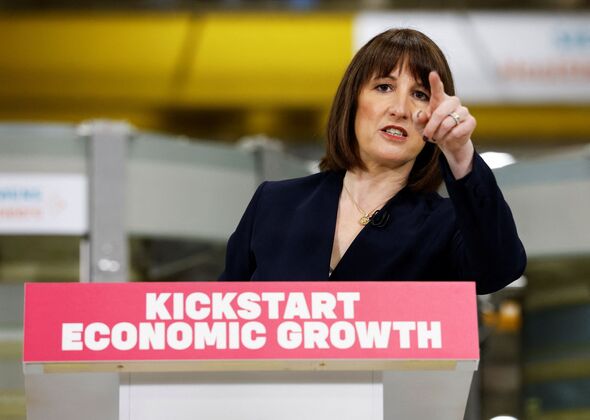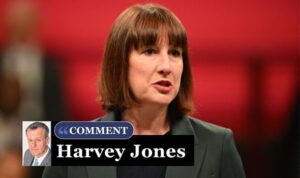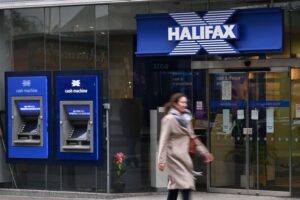
UK inflation surges from 2.5% to 3% in another blow to Rachel Reeves (Image: Getty)
In a fresh blow to Rachel Reeves UK inflation has increased – driven by a rebound in airfares and significant hikes in private school fees.
UK inflation increased in the year to January in what will be yet another blow to the chancellor and Keir Starmer.
Consumer Prices Index (CPI) inflation rose to 3% in the 12 months to December, up from 2.5% the previous month, the Office for National Statistics (ONS) has said.
Grant Fitzner, ONS Chief Economist, said: “Inflation increased sharply this month to its highest annual rate since March last year.
“The rise was driven by airfares not falling as much as we usually see at this time of year, partly impacted by the timing of flights over Christmas and New Year. This was the weakest January dip since 2020.”

Rachel Reeves said her “number one mission” was getting “more pounds in pockets”. (Image: Getty)
Mr Fitzner noted that the cost of food and non-alcoholic drinks also increased, particularly meat, bread, and cereals.
He added: “Private school fees were another factor, as VAT rules meant prices rose nearly 13% this month.”
Responding to the figures, Rachel Reeves said her “number one mission” was getting “more pounds in pockets”.
The Chancellor said: “Getting more money in people’s pockets is my number one mission. Since the election, we’ve seen year-on-year wages after inflation growing at their fastest rate – worth an extra £1,000 a year on average – but I know that millions of families are still struggling to make ends meet.
“That’s why we’re going further and faster to deliver economic growth. By taking on the blockers to get Britain building again, investing to rebuild our roads, rail and energy infrastructure and ripping up unnecessary regulation, we will kickstart growth, secure well-paid jobs and get more pounds in pockets.”
Core CPI inflation, which reflects the change in prices of goods and services – excluding those from the food and energy sectors – has also surged.
The core inflation rate is the metric used to determine the impact of rising prices on consumer income. The Bank of England also takes this number – along with the CPI – into consideration when deciding whether to adjust the Base Rate.
According to the data published today, Core CPI rose by 3.7% in the 12 months to January 2025, up from 3.2% in December.

Dame Diana Johnson said the Government has “a long way to go in turning around the economy around’ (Image: PA)
Economists say the data makes it highly unlikely for March Base Rate cut, and warn inflation will only increase from here.
Suren Thiru, economics director at the Institute of Chartered Accountants in England and Wales (ICAEW), said: “These figures confirm a disheartening rebound in inflation as rising air fares and the introduction of VAT on private school fees contributed to notably widen the gap with the Bank of England’s 2% target.
“In the coming months, the only way will be up for inflation, with higher energy costs from April, the looming national insurance rise and global trade frictions likely to lift the headline rate close to 4% by the summer.”
He added: “This increase means that a March rate cut currently looks improbable. With inflation headwinds mounting, including April’s major rise in business costs, a May loosening – while still likely – is not yet a foregone conclusion.”
Tom Stevenson, investment director at Fidelity International, said the jump in January’s inflation rate “was worse than expected.”
He said: “The outcome was significantly higher than the 2.8% forecast by most economists. This month’s spike looks like the start of a tricky six months on the growth and inflation front.
“The Bank of England recently warned that rising energy prices would see inflation reaching 3.7% by the third quarter of this year. At the same time, the economy is stagnating, with barely any growth at all in the six months since last year’s election.”
Policy minister Dame Diana Johnson said the Government has “a long way to go in turning around the economy”. Still, she insisted there were a “number of factors involved” in rising inflation, including increased global energy prices.
She told Times Radio: “We’ve had 14 years of economic stagnation, and in seven months, we’re not going to turn around the economy that quickly. I think it’s quite clear there are a number of factors involved in why the inflation rate has gone up, and I’m told particularly part of that is around energy prices and some of the rising global prices for gas.”
She added: “We’ve obviously got a long way to go in turning around the economy.”
It was put to Dame Diana that Labour’s move to end the VAT exemption for private schools had been blamed in part for the rise.
She said: “I think you have to put it into context. We’ve seen three reductions in interest rates over the time that Labour’s been in power. Wages are growing at the fastest rate for three years, so there is positive news there.
“But I accept that the announcement in the last few minutes is one that we’ve got to work on.”
What does the inflation rate mean for your money?
The rise in the inflation rate means higher product prices and a fall in the purchasing power of money. When general prices rise during inflation, but the value of money stays the same, households can buy fewer goods for the same monetary sum.
As CPI rates report a 3% inflation rate in the UK, this indicates that goods now cost 3% more than last year.
Alice Haine, personal finance analyst at Bestinvest by Evelyn Partners, the online investment platform, said: “Higher inflation diminishes spending power and erodes savings, making it harder for people to maintain the living standards they desire.
“While inflation at 3% is still a vast improvement on the peak of 11.1% at the height of the great financial squeeze in October 2022, the BoE expects higher energy prices to lift inflation to a peak of 3.7% later this year. Whether this slows the pace of rate cuts remains to be seen. The BoE made its third quarter-point rate reduction since August earlier this month. Many households, particularly those grappling with oversized mortgages or heavy debts, are likely to be hoping for a fourth reduction next month.”
She added: “Household budgets are already set for a heavy hit in April when household bills such as energy, water and council tax jump up again. For retirees on fixed incomes, who have also been hit by the Government’s decision to scrap winter fuel payments for all but the poorest pensioners, times may feel very tough.”
















